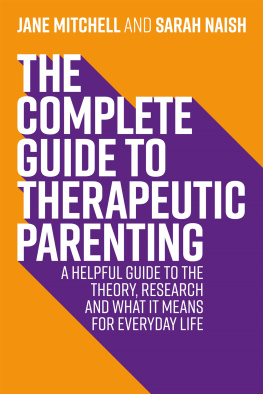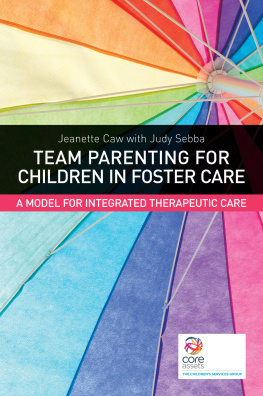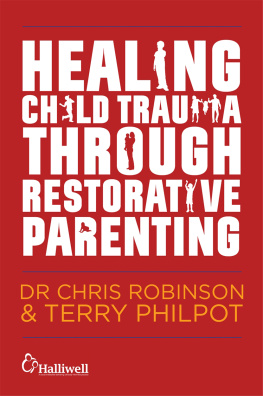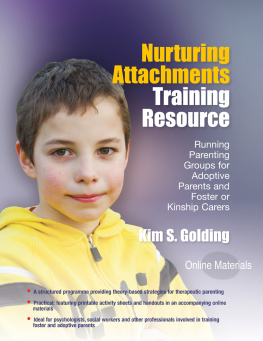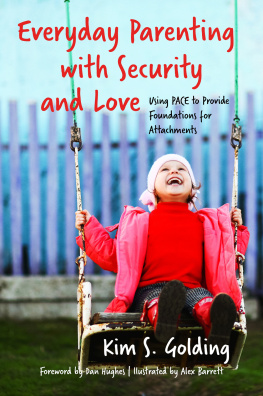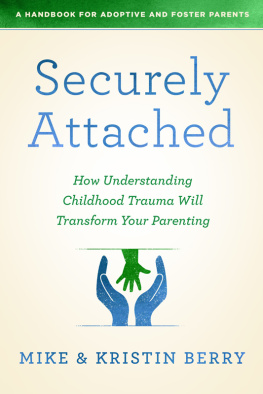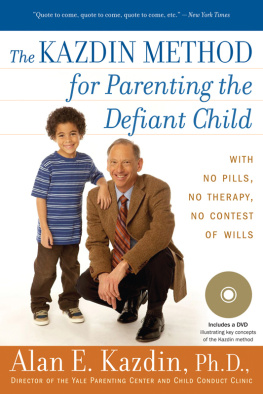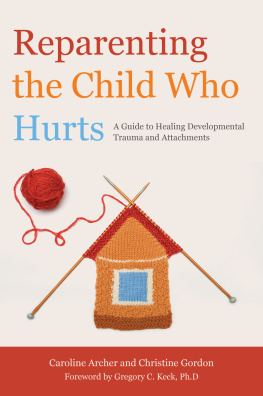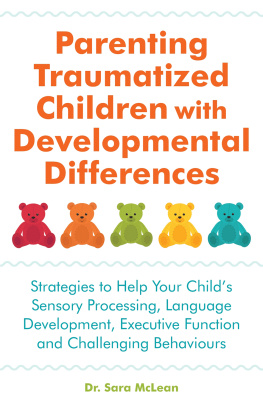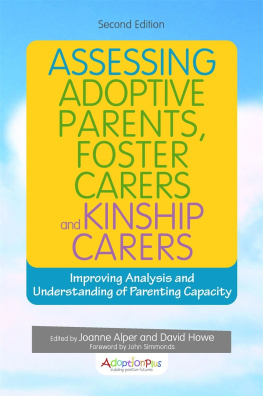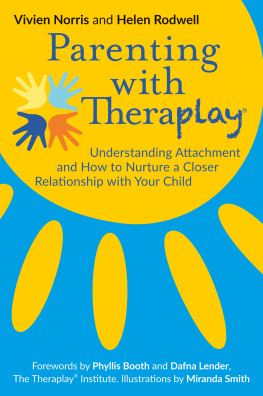Contents

THE COMPLETE GUIDE TO
THERAPEUTIC
PARENTING
A HELPFUL GUIDE TO THE
THEORY, RESEARCH AND WHAT
IT MEANS FOR EVERYDAY LIFE
JANE MITCHELL and SARAH NAISH

Contents
Welcome!
Welcome to the wonderful, exhausting but ultimately fulfilling world of the therapeutic parent! Whether you are a parent (foster, adoptive, biological or family member), social worker, teacher or other supporting professional, we hope that you will find within these pages some helpful insights and solutions.
Throughout this book we refer to parents because whether you are a biological parent, a foster parent, an adoptive parent, a special guardian or a kinship carer you are definitely a parent, and what you are doing is parenting your child or the child who is in your care.
The legislation and procedure referred to is the English system, my apologies for being unable to supply relevant information for individual countries. However the broad concepts of Therapeutic Parenting given throughout the book are being used effectively worldwide.
In the book you may encounter unfamiliar terms weve tried to explain these on first mention where possible, but if you need a reminder, do please check the index, which has an entry in bold for where a technical term or piece of jargon has been explained.
A note about the case histories
Each case history is based on a combination of real life stories drawn from my long career as a trainer and supporter of families. These have been anonymised to protect the families involved.
About the authors
Jane Mitchell
My whole life has been centred around children, from the time my first sibling arrived (I am the oldest of five), through to my first jobs in babysitting, then creating my own family and working in childminding, before studying for a degree in early years childcare and education. I am now Director of the National Association of Therapeutic Parents, and an adoptive parent myself as well as a birth mother of three. I specialize in developing resources and training for the Centre of Excellence in Child Trauma around attachment, developmental trauma and related neuroscience. I have been involved in running a Diploma in Therapeutic Parenting and have worked with adoptive and foster families for over 15 years.
Sarah Naish
I am an adopter of five siblings and a former foster parent, social worker and owner of an independent fostering agency. I work full time in training and consultancy within adoption and fostering and am also the CEO of the Centre of Excellence in Child Trauma, which encompasses the National Association for Therapeutic Parenting.
About our books
This book is part of a series of books on therapeutic parenting we will start by briefly describing each book in the series to give you a sense of where this books fits, and its particular strengths.
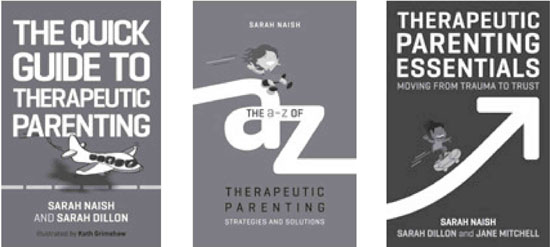
The Quick Guide to Therapeutic Parenting by Sarah Naish and Sarah Dillon is a visual introduction perfect for newcomers who want to grasp the essentials or to give to grandparents or teachers who just want a simple explanation with cartoons, easy-to-understand information and inspirational quotes throughout.
The AZ of Therapeutic Parenting by Sarah Naish is, as the title suggests, an AZ of really useful strategies to help therapeutic parents with common everyday challenges.
Therapeutic Parenting Essentials: Moving from Trauma to Trust by Sarah Naish, Sarah Dillon and Jane Mitchell is a book which describes the real, lived experience of therapeutic parenting what it looks like in practice, and how it feels not only from the parents perspective, but also from the childs.
The Complete Guide to Therapeutic Parenting by Jane Mitchell and Sarah Naish this book, which aims to look under the bonnet of therapeutic parenting to explain how and why it works, including the theory and research that lies behind it. Its been written to be accessible and informative, but also based on the latest findings about trauma, the brain and therapeutic parenting. Throughout this book Jane has used examples from her own experiences of parenting to highlight certain issues. For that reason, although Sarah is a co-author due to her outstanding contribution to how we understand childhood trauma and because of the material used within the book as well as our past collaborations, in this book Jane has taken the lead on the written material and for that reason has written in the first person singular. Where Jane writes I or my she is referring to her own experience and knowledge.
The journey to therapeutic parenting
In training about therapeutic parenting, people often say that they wish they had had access to this knowledge years ago such is its power.
But of course, the information about developmental trauma and the role of an attuned adult in the neurological, physical and emotional development of a baby is relatively new. It has been evolving over the past 20 years as science and psychology have combined to give us greater information about neurological development and original thinking about the importance of emotional literacy. It has deepened our understanding of the ways in which our earliest relationships shape the way we interact with others and how we approach life. The application of theory and research to understanding and parenting children who have suffered developmental trauma is still a work in progress, and we continue to learn more about this fascinating subject.
I remember bringing my adopted daughter home, so vividly! I had birth children and had been a childminder for several years. For the last four of these, I had been working with the local authority and supporting vulnerable families. I met my daughter while childminding her, and after the usual process I was able to adopt her 18 months later.
Like so many of us working with children in childcare, education or social work, I thought I knew the answers to my daughters behaviour. It did not take me long to find out I was wrong, but finding out what on earth was happening was a much longer process!
Back in 2003, when I was trying to find some answers, I started with Daniel Goleman and his writing on emotional literacy. Daniel wrote a book called Emotional Intelligence in 1996 which explored how the architecture of the brain underlies emotion and rationality, and how emotional intelligence can provide a basis for self-awareness, empathy and social skills qualities which are found in individuals who have positive relationships and successful careers.
This made sense to me as a starting point it was clear that helping a child to understand their own needs and feelings by developing their emotional language would help them to learn to ask for help and manage those feelings, but it didnt give me the answers I needed to help a child who showed behaviours that were off the scale beyond anything I had encountered before that point.
Over the following years I attended seminars the best were at the Centre for Child Mental Health in Islington organized by Margot Sunderland and I took whatever training I could find and read everything I could get my hands on. I discovered books by Dan Hughes, who writes about child trauma with insight and humour, and was able to give some strategies to help a revelation to me back then!

